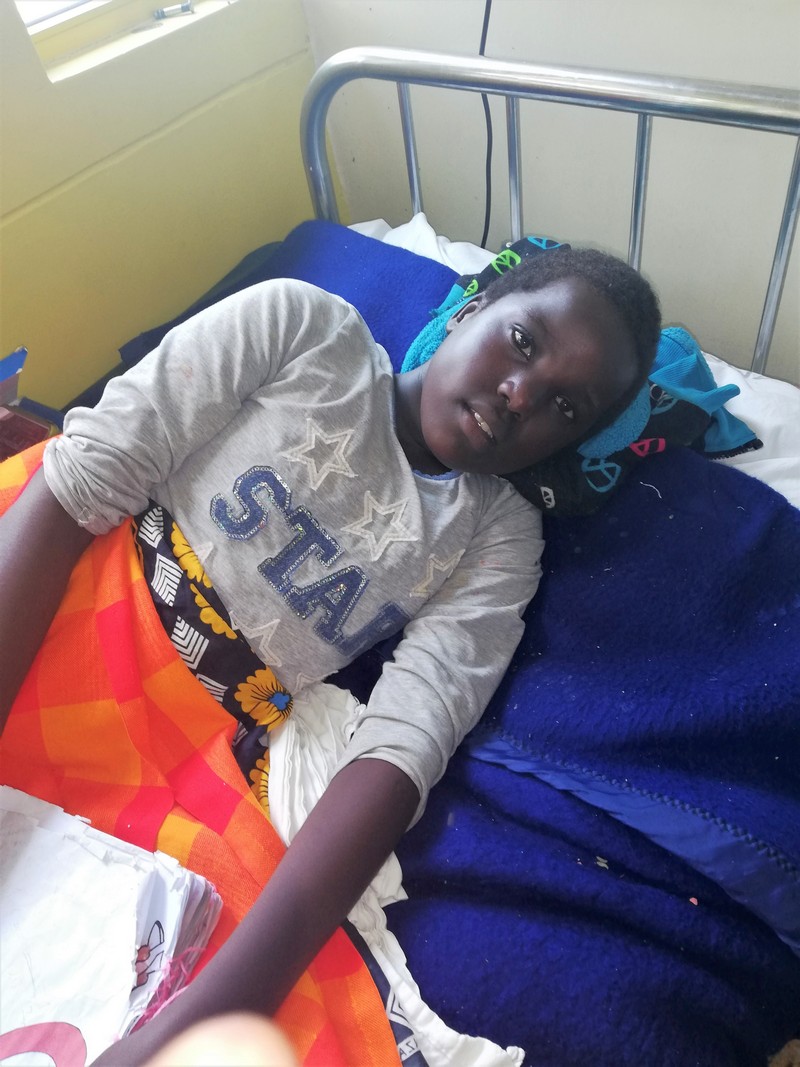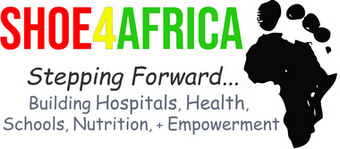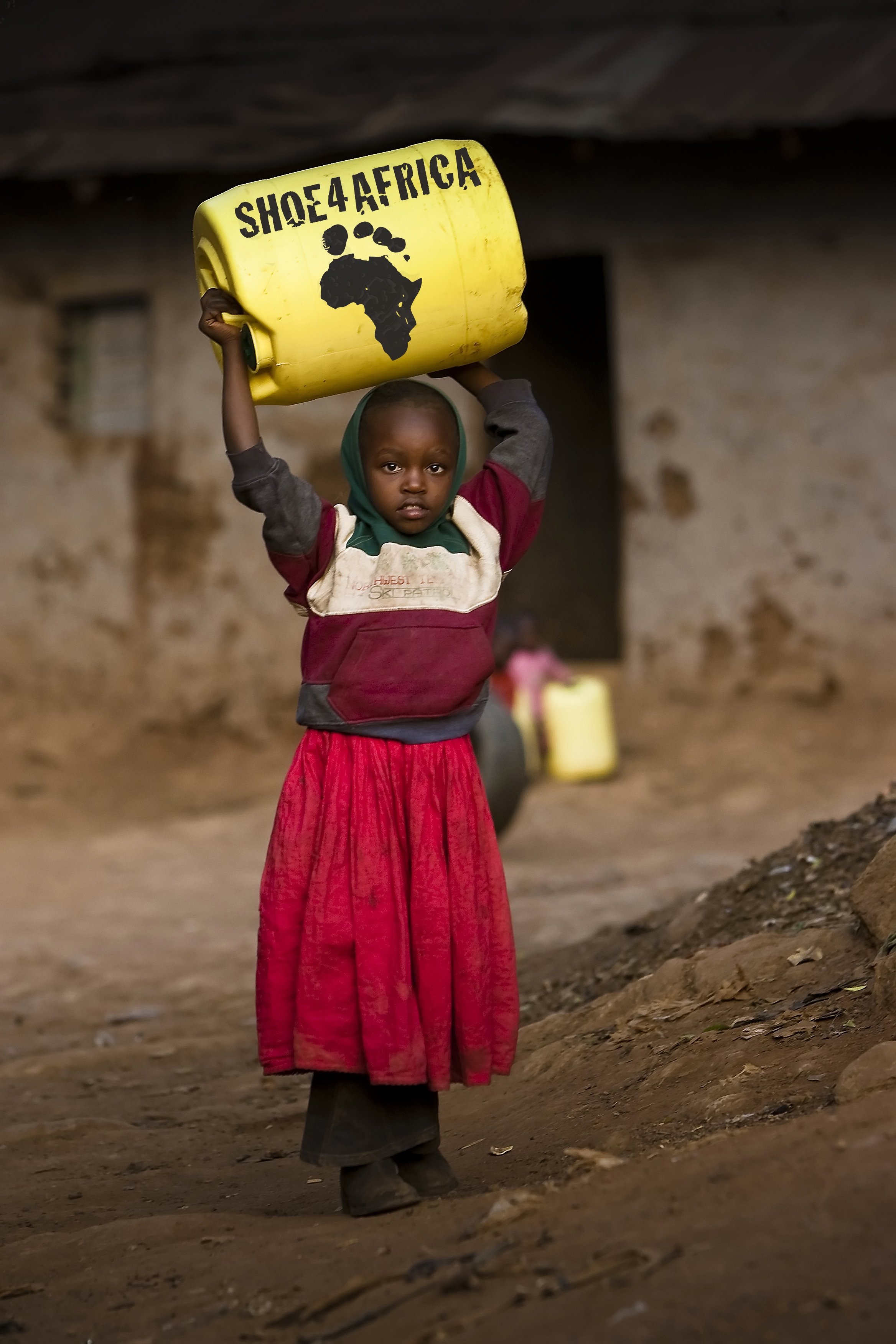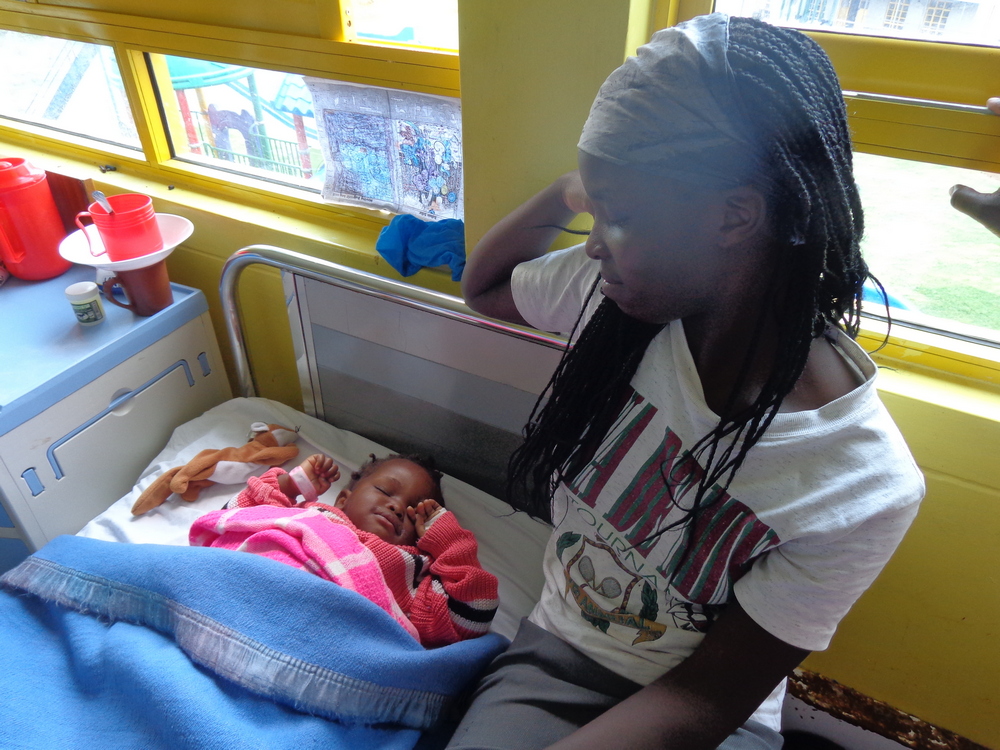
Stories from our hospital
Noelle is a resident of Langas slums, where our largest intake of patients come from. She’s a young twenty and came to the slums to visit her aunt, met a cobbler, got pregnant, and now stays home as a parent. She dropped out of school at a young age due to family poverty. With little money their iron-shack home has one room, and hers is a common story. Abigail Khavugni, her daughter, climbed out of the one bed the family shares and knocked the table (A wooden stool) over, sending a scalding pan of porridge pouring over her legs. She arrived on the back of a motorbike.
Noelle likes staying at the hospital and, looking around the ward at the other 30 to 40 burns patients, considers Abigail to be a lucky one. She says the Doctors visits are twice a day and Nurses are constantly in the ward attending to the patients. “I didn’t know hospitals like this existed for our children, I am grateful to this charity,” she smiles. I only wish we were a ‘job center’ too, as almost every other mother is seeking employment. Unlike many western countries Kenya doesn’t have any form of social security and her husband gets work maybe once or twice a week, as cobblers are common in the slums.
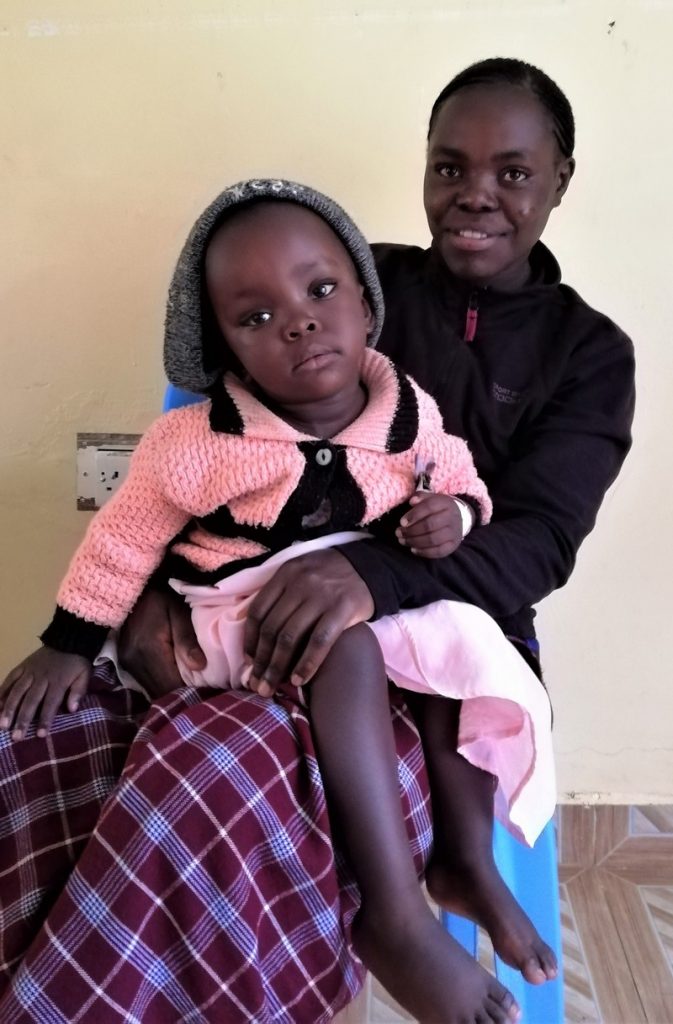
Baby Joylene’s Remarkable Journey of Strength and Hope
In a world painted with hues of courage and resilience, little Joylene stands as a beacon of inspiration, illuminating hearts with her radiant spirit. Last Tuesday, as the sun shone, Joylene, our tiny warrior, celebrated her second birthday in a symphony of joy and laughter.
Shoe4Africa’s Nurse Betty, the guardian angel in scrubs, Child Life Specialists, educators, and our fellow patients, all gathered to witness a celebration of life and determination that is little Joylene. Even the hospital’s Director and administrative staff couldn’t resist joining this impromptu fest.
Joylene’s eyes sparkled with delight as she beheld the masterpiece that adorned her special day – an icing covered cake. Green and white, it stood tall, wearing the words ‘Cocomelon’ like a crown, a nod to the beloved YouTube cartoon that echoes childhood dreams at our hospital.
We celebrate birthday’s out on our back lawn. Laughter danced through the air like confetti, while the kids forgot about their illnesses. Why do we celebrate life so vibrantly at the hospital? I think because in no other place is there more gratitude for life than in a pediatric hospital. Had you walked by, you would have never guessed the place to be a center for treating the sick; every patient wanted to give Joylene a hug and a greeting. Every patient appeared able to dance and laugh with the entertainment.
Joylene’s journey started with uncertainty, her tiny frame besieged by illness. June 15th marked the beginning of her battle, a battle against a formidable foe – a brain growth and hydrocephalus, a challenge that tested her very essence. Again, you question, why should a two-year-old have to face such a battle? Her mom, with bravery in every heartbeat tells us that in the face of darkness, Joylene’s family sought answers. “I walked the corridors of this hospital in pursuit of a remedy. Each step I took was a prayer. I held onto faith as I had nothing else to hang onto, that was before I came to this hospital…” she begins.
We have a pastor who drops by to visit both patients and parents, as he always says, “Doubt whispers, but Hope roars!”
Joylene had arrived in a critical state – vomiting, weak body, lack of motion, a weak neck, terrific headache, and veins all over her forehead. Mom recalls that “Dad and I visited five hospitals severally but none of them could tell us what our child was suffering from. All we could see was that her neck was growing weaker. Only at Shoe4Africa did we get a proper diagnosis, but I still don’t understand ‘Water on the Brian’ disease.’
A day after the diagnosis was made, Joylene underwent surgery, and the water was drained. A week later, she was recovering quite well and was beginning to regain her balance and motor skills. That is even when the idea of the birthday party was made real. “My husband was stunned when I called to tell him that our daughter was regaining health, especially since we were growing more convinced that our child was bewitched and doomed,” said Mom. “He hopped onto the first matatu (14-passenger service vehicles) to Eldoret to witness it as he didn’t believe she could have recovered.”
Today, Nurse Betty says Joylene is progressing excellently and should, this week, go back under the blade so the growth can be completely removed. Thereafter, she can recover and then leave our hospital to go home. Meanwhile, Mom is still enjoying “the overwhelming realization” that her child now has the chance to live to fight another day.
In the heart of this story, we find a mother whose faith transcended the shadows of doubt. “There was a time I thought I would never hear my daughter laugh again. After every visit to a medical center and no diagnosis my heart sank, and my spirit was broken. But Shoe4Africa revived Joylene. Every birthday from now on for Joylene will be my reminder to accept life’s challenges and understand that adversity does not mean a downward spiral. I took birthday’s for granted, but not anymore. God bless those who have the heart to help.”
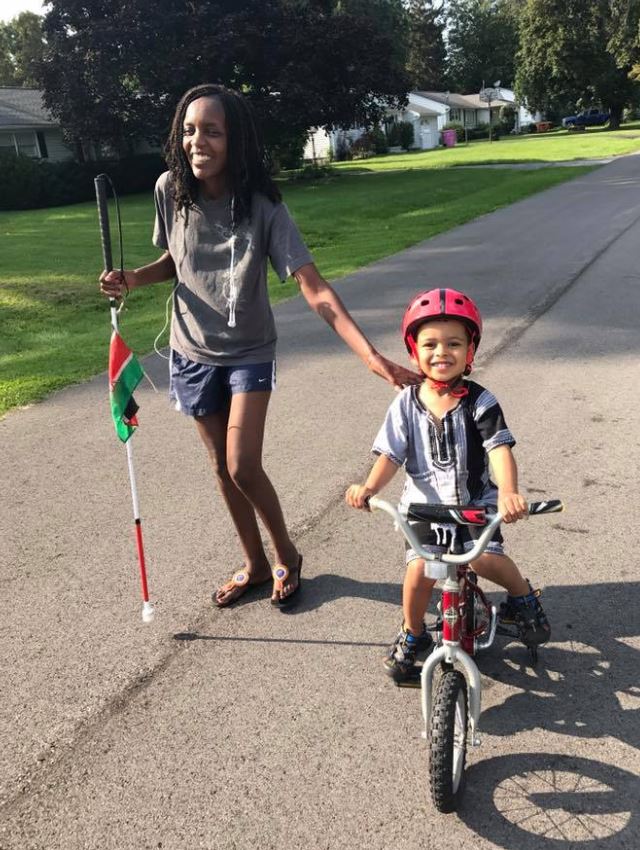
HELEN CHERONO AUG 2023
As a 12-year-old girl growing up in Olenguruone, a small village in rural Kenya, my world was shattered when I began losing my eyesight. I was filled with fear and confusion, convinced that I had done something wrong to deserve this tragic fate. It was so embarrassing when some of my schoolmates discovered my condition. While some of them laughed at me, others tried to be kind, but the pain of being different, and a burden, was unbearable.
Being the top student in class, I took pride in my academic achievements, but my eyesight started to betray me during exams. I struggled to see the blackboard where the teachers wrote, especially during rainy days or when darkness enveloped the classroom due to the lack of electricity in my ‘mud and wood’ constructed school. My dreams of excelling in my studies were slipping away, and it was devastating.
When I showed my report card to my dad, I could see the shock and worry in his eyes. He could not understand how an A-student was now failing the simplest of exams. At first, due to stigma and shame, I hid my disability and faced his wrath, but, as the months rolled on, it became impossible to hide the disability, I was forced to open up. I could not walk without bumping into objects and bad eyesight became no eyesight.
But even though dad was empathetic, he told me the truth, he was deeply concerned about the lack of medical access, not only in our village, but in our county. My neighbors and family members suggested visiting witch doctors, seeking desperate solutions for my eyesight, but my father remained steadfast, not giving in to their pressure. I am forever grateful that he didn’t succumb to superstitions and understood that I needed real medical help.
The following school term, I faced a difficult decision – to return to a place where I felt vulnerable, often ridiculed, and possibly ranked last among my peers, or to stay home and take care of the cows. It was a heartbreaking choice to make, but I couldn’t bear the thought of being a subject of laughter and pity. The lack of access to an ophthalmologist made my situation seem hopeless, and I felt trapped in a world of darkness.
To this day, the lack of proper medical facilities, especially eye hospitals for children, remains a pressing issue all over Kenya. Countless kids continue to lose their eyesight due to treatable conditions like cataracts, simply because access to medical care is limited.
But amidst this darkness, there is hope. With the support of compassionate individuals and organizations, we can bring light to the lives of these children. Every child deserves a chance to see the world, to learn, and to dream without limitations. Building eye clinics for kids in Kenya is not just a medical necessity; it is an act of compassion and love that will transform the lives of countless children.
I am a living testament to the power of having access to proper medical care. I did not stay in my village tending cows, I finally received help, and have now traveled the world. I have represented Kenya at the Paralympics, I have competed at two World Championships, at the Pan American games, and I play baseball for a team in Rochester, furthermore, I lead a charity to help blind children in Kenya.
Today, my heart overflows with gratitude for those who cared enough to make a difference in my life. Now, it’s my turn to stand tall and create a brighter future for the less fortunate children of Kenya. Let’s wipe away the tears of despair and replace them with tears of joy, hope, and ambition as we watch these children regain their sight and reclaim their lost dreams.
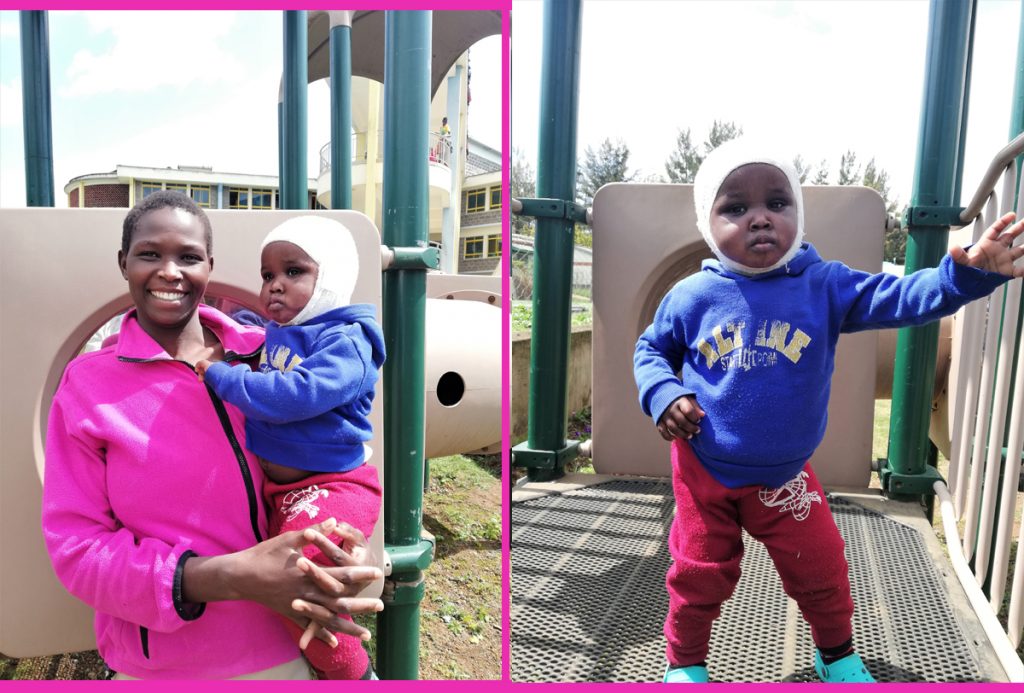
JULY 2023 Meet the cute baby Cheruto, a little fighter who has overcome adversity and reignited the flames of hope in her mother’s heart. Cheruto’s story is one of resilience and determination that shines a light on the strength of the human spirit.
It’s true that there has been a surge in burn cases for young kids in Kenya, and unfortunately, Cheruto became part of this concerning statistic. But let’s focus on the positive side of her journey. Cheruto is a beautiful two-year-old girl whose name in the local dialect signifies a ‘special moment’ of her mother’s life. She lives with her loving parents, Chepchirchir and Ken, in a close-knit small community dwelling in a wood hut.
One fateful afternoon, an accident occurred when Cheruto’s mother was preparing tea for her father. In a moment of curiosity, Cheruto accidentally pulled a boiling large saucepan brimming with tea, causing severe burns on her face, head, and upper body. It was undoubtedly a traumatic experience, but the power of community support was evident as neighbors, including her grandma, rushed to help.
Knowing that time was critical for her daughter’s survival, Chepchirchir decided to rush Cheruto to Shoe4Africa for specialized care. Neighbors were begged for funds so the family could jump on public transport to ride to Eldoret town center where our hospital is based as the family don’t own a car.
Upon arrival, Cheruto received immediate attention in the emergency area. Mom, who has lived as a poor citizen never expecting any priority treatment was amazed as the skilled doctors and nurses at Shoe4Africa took exceptional care and prioritized Cheruto at once. She was admitted to the Ushindi ward (Swahili meaning those admitted will heal; victory), where her journey to recovery began. With constant monitoring from Dr. Mildred and the support of the medical team, Cheruto’s condition improved from day to day.
After two weeks of intense care, Cheruto underwent grafting, a crucial step in her healing process. It was a turning point that marked the beginning of her remarkable recovery journey. Cheruto, who had arrived traumatized and not moving, surprised everyone with her progress. She regained strength, started walking, and even began playing with other children out on our playing field and in the playrooms. Her resilience and determination were nothing short of awe-inspiring.
Cheruto’s recovery not only brought joy and relief to her parents but also ignited a spark in mom’s heart. She realized that nothing is impossible and that she can achieve her dreams, despite the challenges life throws her way. At only 23 years old, mom, who admits she had lost hope, was inspired after spending days herself in our kids’ classrooms and starting to learn with the older kids. She now sees a bright future ahead, and she plans to pursue her dream of becoming a teacher as soon as she can.
The story of baby Cheruto is a testament to the power of hope, love, and community support. It reminds us that even in the face of adversity, we can rise above and find strength in the darkest of moments. Cheruto’s journey teaches us that tribulations can be powerful motivators, driving her mom to achieve what she once thought was impossible. “Did it take my daughter to suffer to waken me?” She questions.As Cheruto continues her recovery, we send her all our love and support. Her courageous spirit and the unwavering love of her family and community are a beacon of light for us all. Let us celebrate this little fighter and be inspired by her determination to overcome and thrive. Our goal, our dream at Shoe4Africa is to create a world where every child gets a chance to grow, dream, and achieve their full potential…and every mom too! Thank you for your support of Shoe4Africa.
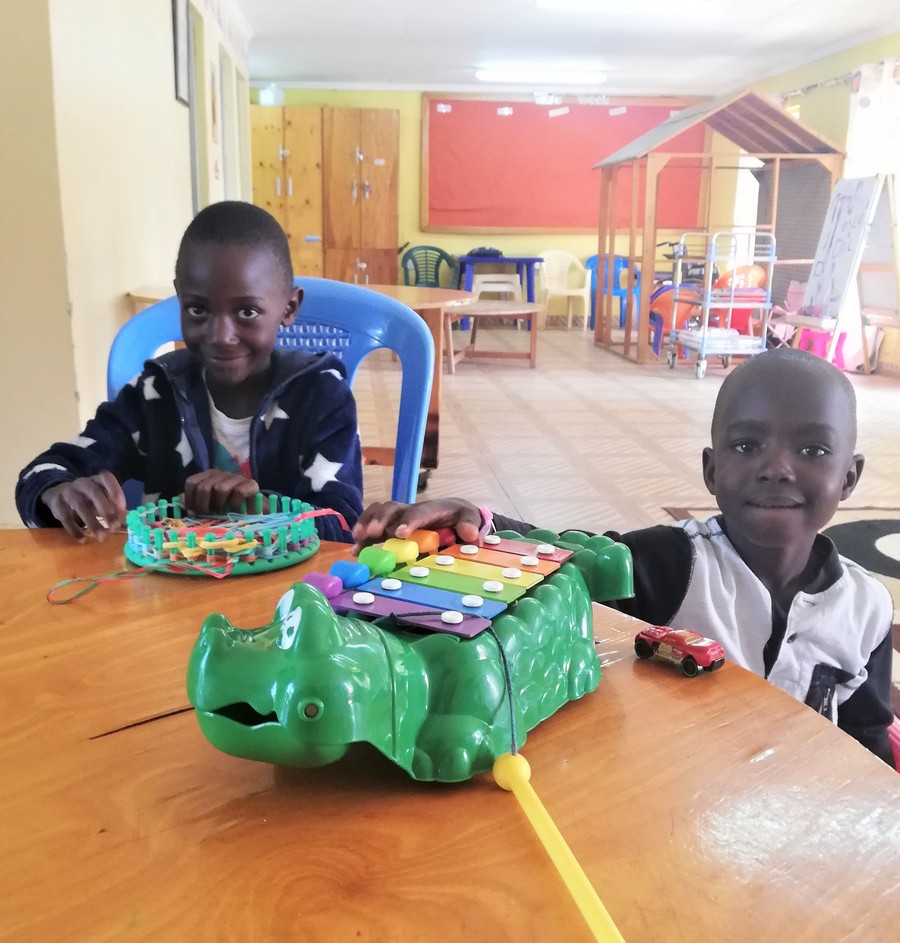
July 2023, Grace Adhiambo is a beautiful 7-year-old who, more than anything, loves simple basic things. For example, she loves to skip rope, and she does it every single evening after school, just before the warm evening shower from a bucket of water in her family’s rickety makeshift bathroom that is built about five meters from the family’s main house. She also likes to get creative with threads and is forever trying to weave something out of nothing. In addition, since the birth of Maliah, her now 8-month-old baby sister, she adores caring for her. In fact, being a caregiver is her dream right now, she dreams only of caring for others.
“About a month ago,” Nancy (Grace’s mom) started to narrate, “Grace started to experience symptoms that resembled Malaria’s signs. Tests at a nearby health center confirmed as much. Attempts to treat the fever for the next 2 weeks proved futile. Grace’ tummy started to swell and was significantly painful. The bubbly little girl I always knew was gone, as she grew very weak and lost her appetite. This was very unsettling for Grace’ dad, who always longs to get home after work to enjoy his time with his three daughters, Atieno, Grace, and Maliah. It became nearly impossible to concentrate on Atieno and Maliah, especially since in most of the fun activities they engage in, Grace is usually the first.”
“2 weeks ago, at 3 am, Grace started to make noises of pain from the girls’ bedroom, which is just a few feet from our bedroom. When dad went to check, she was lying on her back trying to contain the pain, in vain.
Immediately, my husband and I decided enough was enough. ‘We have to take her to an actual hospital, Nancy,’ Grace’ dad said. At 6 am, we rushed her to the same health center we had visited before. We needed to get painkillers that would help sustain her until she could get to Shoe4Africa, especially considering the distance between our home and the Shoe [Shoe4Africa].”
At 7 am they boarded the crowded public transport bus known in Kenya as the ‘Matatu.’ After a long day in traffic, they arrived at Shoe4Africa at 5 pm, whence the treatment started. Dr. Oriaso picked them up quickly at the Emergency Unit on our ground floor and started on blood tests and X-rays. The next day at 6 am, Grace was undergoing surgery. The results had shown that she had a small patch of perforated intestines and an umbilical hernia, a condition described as a protrusion at the belly button. The surgery was targeted at both getting rid of the perforated intestines and fixing her umbilicus.
Two weeks into treatment, Dr. Kangogo, the surgeon in charge of the surgical operation, says that in his assessment, in the next two weeks, the wound should be healed well enough to allow for discharge.
We always keep patients a little longer because the risk of infection from a child that lives in a temporary house without plumbing often means there is a higher rate of wounds getting infected, and that could be fatal.
Grace, Nancy says, has been keen to ensure she takes all of her prescribed medications and has set reminders in her school book for when the nurse comes to check her wound. She tells us this adding, “When I become a mom, I will have to take care of these things, so it is good I practice now.” Sounds like she could be a good recruit for a Nurse at our hospital!
She has also written out a schedule to make sure that when her dad comes over next week to stay at the Shoe4Africa hospital and fill in for mom, when mom goes back home for a turn to look after the other two kids, she will not miss anything. Most parents can’t afford to commute back and forth and as they don’t own a car the long trips on public transport make each parent take turns in staying for a week. “I’m not complaining,” says Mom, “I actually like living at Shoe4Africa. We get three cooked meals a day, Grace goes to school in the hospital classrooms, so for me it is like a holiday! But I need to give Dad a break, Maliah takes a lot of looking after.”
Only upon hearing this does Grace suddenly look unhappy, “That’s the only bit I miss. I wish my sisters could live here with me!” As they say, sometimes it feels like Hotel Shoe4Africa, instead of the Hospital Shoe4Africa! Once again, thank you for your support, so we are able to help so many.
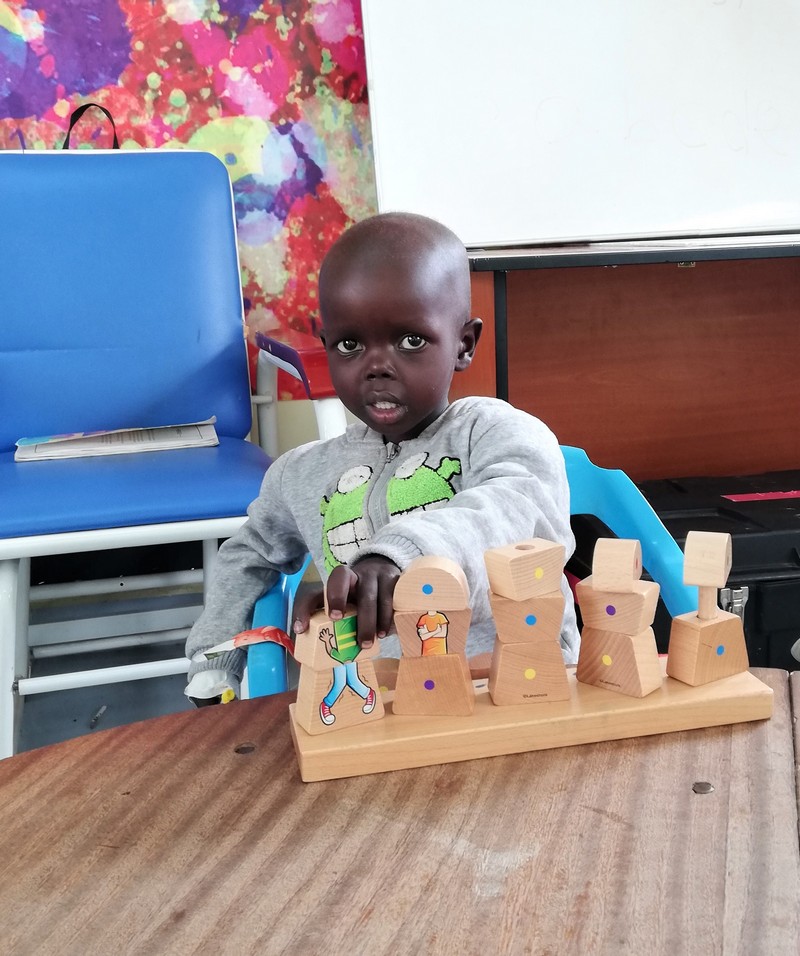
Abigael, SEP 23
Out of 26.2 million children under the age of 18, Kenya has close to 4 million Orphans and Vulnerable Children (OVCs). Statistics show that every single day, an average of 700 children become orphaned, meaning that in every 2 minutes, one child is orphaned. Such tragedy continually affects the nation in increasingly diverse and dire ways.
Unfortunately, some of the children who fall under the vulnerable category are not orphans. Many times, parents just chose to ignore their sacred responsibilities as parents. The 3-year-old, Abigael, a patient at our hospital, can safely be described as a vulnerable child because her mother, upon delivery, decided she was not going to participate in her upbringing. Why?
Well, Abigael was born when her mother was in high school. The baby’s father was also a high school student, making them anything but ready for parental responsibilities. They were young and financially and mentally unprepared for such a huge responsibility. “However, the deed had already been done and there was no going back,” said Christine, Abigael’s guardian, and grandmother.
Abigael’s mom could not come to terms with this reality, and neither could her own parents, so they chased her away. Graciously, Christine took her in and provided for and protected her until she gave birth. Immediately after delivery, the day after, Abigael’s mom disappeared, never to be heard from again. According to Christine, “Abigael’s mom felt that the baby would slow her dreams down, and that was not something she was willing to accept.”
So, when she left, Abigael became Christine’s responsibility.
A little bit over two and a half years later, Christine was met with a new reality – Abigael’s health deteriorated. “I never, in my wildest imagination, ever thought that such a tragedy would befall me – offering to support Abigael and then getting bombarded with this feels a lot like a punishment. I have questioned fate, faith, God, and everything I could imagine,” said Christine with a demeanor of sadness. These feelings were heightened by the fact that Christine is a single mother, whose husband passed away in 2015. She is also unemployed, and only relies on odd jobs, which she says are never much, in terms of their scarcity and the little income they bring. Furthermore, her children have all not been lucky since she was never particularly able to provide them the best education, and some even never stepped foot in a classroom. As such, getting an additional responsibility of availing Abigael of treatment felt so much like a punishment.
About six months ago, Abigael started to present symptoms that for a prolonged while, were regarded as Malaria by the various quack doctors in their village of Mutwol. Given the high temperatures and headaches, these self-trained doctors whose medications often help Christine’s community, especially since there are no nearby medical facilities within the area, diagnosed Abigael with Malaria and repeatedly treated the same.
Months passed by without any progress. Abigael, instead, grew more worrying signs like a swollen stomach, hard and pelleted fecal matter, and veins all over her little tummy. These signs became Christine’s cue that an actual doctor was necessary, so she took her to the nearest medical center that is over 90 km away from her home. On arrival, the attending nurse advised her to take the first bus out to Shoe4Africa, stating that Abigael needed urgent proper help that even they could not offer.
“I had never been to Eldoret. When she said to come here [Shoe4Africa], for a moment, I stood there and laughed – I guess I should have been more of a traveler – I told myself. But this was how I was going to know this town with the only public children’s hospital,” Christine said laughing.
Abigael and Christine arrived on March 31, into the able hands of our gifted Dr. Mogeni and Nurses Mary and Sophie. Upon conducting tests and X-rays, they established that Abigael had kidney cancer.
“What? But we’ve been treating Malaria!” said Christine in shock, when Dr. Mogeni came to relay the results of the tests. According to Christine, it took days to come back to her senses, after which Nurse Sophie and Mary helped her understand the results, and what would then have to happen.
The first step would be the 6 weeks of chemo cycles that were followed by a surgical procedure to remove the infected kidney. “When I asked if the cycles would do the trick, Nurse Sophie explained that although they would go a long way into treating Abigael, a surgical removal would be the best way to ensure better results, hence the surgical operation,” said Christine. The procedure took place about 3 weeks ago, and Abigael has improved tremendously. Her appetite, body weight, stomach, and overall appearance have improved greatly. She is currently on radiofrequency treatment (radio), after which Dr. Mogeni should recommend the next steps.
So far, Christine’s faith has been restored. She feels hopeful about the recovery and believes everything will go well. In fact, she already has plans for little Abigael. She says that she prays that Abigael gets well so she can discharge and go back to her home, which is currently under lock and key. Most importantly, she wants to try giving her the best education she can afford because she believes she will one day be her own saving grace, considering that her own children have not been able to do so. Confidently, Christine said, “Abigael is my one hope, and I sure will put my best effort to see that she becomes all that she was ever meant to be. Such is life here in Kenya, as for when a child is abandoned it falls on the community to take that child in. So I guess that was my fate. All I can say, is thank goodness for this public hospital or Abigael would be lost today.”
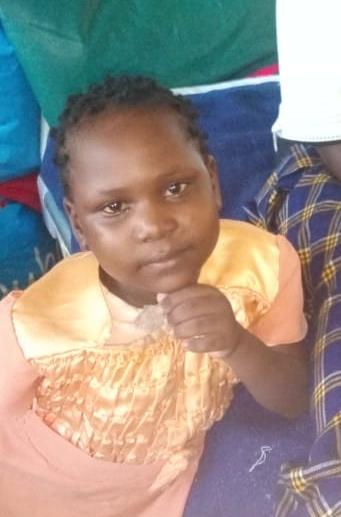
Bicycles
At our children’s hospital in Eldoret, the days are understandably filled with both hope and hardship. The children, many of whom are battling serious illnesses, are always on the lookout for any distraction to cheer them up. Therefore, we are always searching for new ideas. The latest is bicycles! Unlike an American hospital where the majority of kids are familiar with bikes, here most of the kids have never ridden in their lives hence the thrill of learning truly is a transformative experience.
Recently a fleet of new bicycles arrived at the hospital, they are even electric so kids who can’t pedal will be able to enjoy the adventure of cycling. The bicycles are more than just toys; they are fun, and they are tools for healing. It is understood that physical activity would not only help improve the children’s conditions by getting their blood circulating but also boost the mental health side, adding laughter, distraction, and joy to the day.
One of our childlife staff, Hudson, has become the instructor, and the kids use the basketball court to circle, often with Hudson running behind to help stabilize the bikes, till our patients learn balancing skills and can ride around the whole compound.
It is becoming routine that every morning, after their treatments and check-ups, a group of children gather waiting for the bicycles to be wheeled out. We don’t have a bike shed yet so the classroom is housing the ‘toys.’
I asked one of the learners, Angela, 10, if she knew how to ride. She didn’t. She told me she has spent more time in hospitals than most kids spend in playgrounds. She is undergoing treatment for leukemia, and the chemotherapy often leaves her feeling weak and tired. But when she saw the bicycles from her ward window, her eyes lit up and she told me she decided that she would promise herself she was going to learn how to not wobble like the other patients she saw, but ride, and ride fast. So, with the help of Hudson, off she went.
She pedaled slowly, her legs shaky from both nerves and the toll of her illness. Hudson, a pro, made sure of her stability and the task became a tandem effort. I’m not a doctor but I am sure that blood flowing faster around her body, her heart pumping is improving her health. But what she said when she dismounted made me cry, “Today I feel like a normal child. I forgot about my sickness.”
She beamed as her fellow patients congratulated her on her first lap of the field.
The steel bicycles are a symbol of freedom and normalcy. To get out of our overcrowded wards and to reclaim the joy of playing outdoors is a gift. One of our nurses, who saw me watching, came up to my side. “Yes, these new bikes are marvelous. They are really uplifting spirits. Look how determined the young kids are,” she laughed as two kids fought for the same bike. “It’s amazing, isn’t it? These kids have been through so much in their young years, they lie in their beds, but something as simple as a bicycle ride makes things seem good again. We should call this the Pedal patients’ program.”
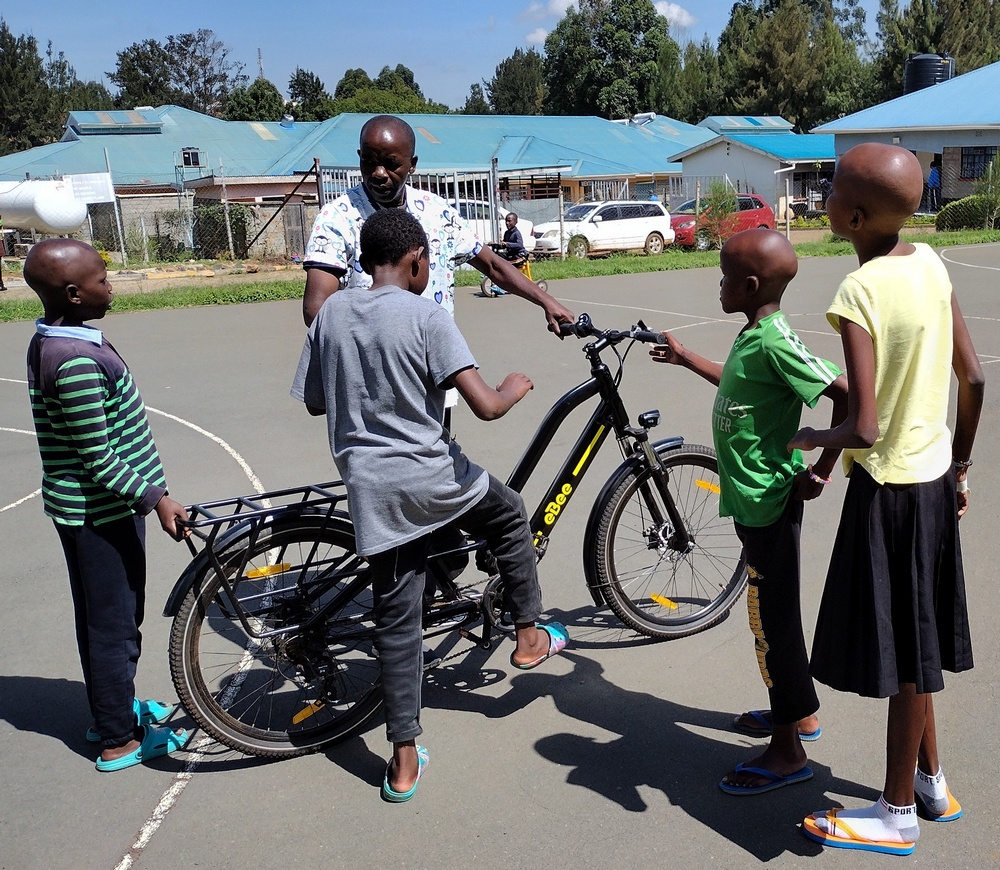
June 6, 2024
Jolene Kwamboka
Last Tuesday, Joylene celebrated her second birthday in grand style. She gleefully tells everyone it was ‘nice, nice.’ The celebration was graced by Shoe4Africa’s Nurse Betty, Child Life Specialists (CLS), educators, other patients, and even a few surprise visits from the hospital Director, and other members of the administrative team. It was, indeed, a fabulous party if you ask Joylene.
Our dedicated team of educators and CLSs prepared a spectacular cake that Joylene’s mom, Damaris, proudly described as green and white with the words ‘Cocomelon’ (from the famous YouTube cartoon) elegantly written around it. The cake was a delightful balance of fluffy, moist, and spongy. Outside, on the lawn where the birthday party took place, there were plenty of drinks, snacks, games, and music for all the children to enjoy. “The atmosphere was so different you could never tell this is a hospital. I love that about Shoe4Africa,” Damaris shared.
Hospitalization is never by choice, but our hospital, together with our compassionate staff, strives to create a home-like environment for our patients. We reimagine spaces that foster better physical and mental health. Despite these efforts, a hospital remains a place where it can be challenging to fully escape the reality of illness. The mere word causes fright for many and that’s something we work on to address. For instance, Joylene certainly hates medicine and injections. Any sight of scrubs brings about hysterical screams that only her mom can soothe.
Baby Joylene’s struggles with scrubs, injections, and medicine began a month ago when she first arrived at the hospital in a critical state—vomiting, weak, with a lack of motion, a weak neck, a severe headache, and prominent veins on her forehead. Within a day of rigorous tests and observation, she was diagnosed with a brain growth and hydrocephalus, commonly referred to as water in the brain. This condition occurs when an obstruction prevents proper fluid drainage, causing water to build up in the brain’s cavities.
“This was the most bizarre diagnosis I have ever heard,” said Damaris, who still wonders how and why her daughter developed such a condition. Coming from a community with a strong belief in witchcraft, Damaris, whose parents are staunch Seventh Day Adventists, went through phases where she wondered if someone had bewitched her child. “Joylene’s dad and I visited five hospitals, but none could tell us what our child was suffering from. All we saw was that her neck was growing weaker. Joylene started to walk at nine months, and we wondered if she was regressing.”
The day after her proper diagnosis at our hospital, Joylene underwent surgery to drain the excess fluid. A week later, she was recovering well, regaining her balance and motor skills. That’s when the idea for her birthday party took shape. “My husband was stunned when I called to tell him that our daughter was now regaining health instead of worsening, especially since we were growing more convinced that our child was bewitched as every single one of those hospitals could not give us answers,” said Damaris. “He hopped onto the first matatu (14-passenger service vehicle) to Eldoret to witness the party.”
Today, Nurse Betty says Joylene is progressing excellently and should, this week, undergo another surgery to remove the growth. Thereafter, she can recover and finally go home. Meanwhile, Damaris is still enjoying “the overwhelming realization” that her child now has the chance to live to fight another day.
Joylene’s journey is a testament that a hospital should not be a bad scary space, and her recovery inspires us to continue with our mission of providing exceptional care and support to children in need. Again, this hospital was built on the goodness of people like you, who are now helping us to build the new cancer hospital, because here in Kenya as the only public children’s hospital in the entire country, we always have an uphill battle. Thanks for having our backs!
Joylene below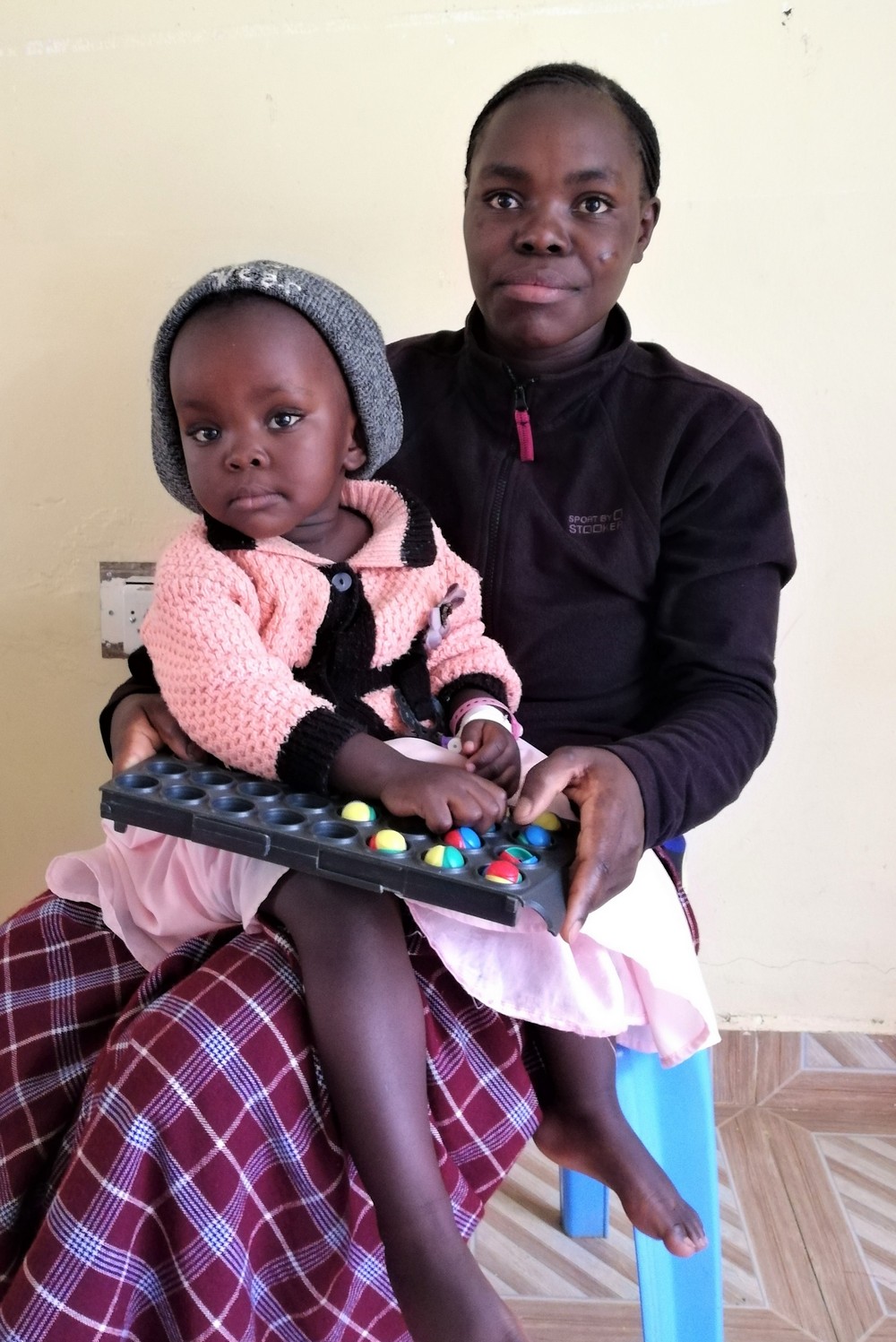
VALENTINE CHEPCHUMBA
About a week ago while making rounds at the hospital, I noticed this girl that was lying sideways in her hospital bed, left elbow firmed against her mattress, as both hands cooperated in knitting a pink piece of rag. “Hm, interesting!” I thought. A quick memory of a time in my early 20s came rushing. My sister had tried to teach me how to knit, but no. Connecting loop to loop or knot to loop, as I believe the craft entails, was too complex an endeavor for me. A few trials, which always ended with my sister frustrated at my insanely poor skill, were enough to let me know that knitting wasn’t for me. Seeing this young girl do it, therefore, intrigued me. I had to go close and see. Was it too late for me to restart my learning? Maybe or maybe not, but that doesn’t matter today.
The 13-year-old knitting pro, Valentine, is a beautiful dark-skinned girl who is somewhere on the lower end of 5ft tall… maybe 5ft 1in or 5ft 2in. She is a charismatic, smiley, and smart little lady, who is very drawn to creative art. One of the art-related things she does is knit things that she gifts to her siblings and school friends. Recently, Valentine decided to start knitting shower clothes for her friends at the hospital. In fact, when I met her, the piece she was working on was for Sharon, a girl 6 beds over from hers. “I like to ask what color they like as well as the shape they’d like for their clothes. This way, I am sure that the person I am knitting it for will like it,” she said.
“How long have you been knitting?” I asked, after noticing how refined her end products and knitting pace were. She definitely had a knack for it. “I started after my first hospital discharge in June 2020,” she said, “and did it full time before I resumed school in July 2021. Because of hospital visits, I am becoming quite efficient at my knitting skills. Why not use my time here if I am bedridden?”
Valentine had been briefly admitted to our hospital, first, in November 2019, and later from February to May 2020, but never again until this year.
Mama Valentine, her mom, as she’s commonly referred to within Ushindi Ward (translates as Prevail, to conquer), says that her daughter’s illness started as an everyday stomachache. After seeking pain medication at a nearby health center, the pain subsided for a few hours before recurring, this time very severely. “I remember very clearly that it was around midnight of November 6, 2019, when the pain abruptly went from zero to critical.” Quickly, amid Valentine’s screams of pain, her father called several neighbors requesting a car ride to the hospital. Four neighbors in, and he got one who was willing to lend them. Quickly, they arrived at our facility. Unfortunately, the 15-minute drive was simply too long. As they drove, her entire lower body from the navel down went into paralysis. Along with the paralysis, came a lack of appetite, and an inability to sit, or relieve herself.
“Your daughter has Guillain-Barré syndrome [GBS – a condition where the immune system attacks the nerves],” Dr. Mildred said to Mama Valentine after several MRIs and a lumbar puncture (a procedure of removing and checking spinal fluid). Two weeks later, she was discharged after the sessions of immunoglobulin therapy, plasma exchange and physiotherapy changed a significant lot. She was finally able to eat, regained the ability to relieve herself unaided, and sit. Later treatments, however, included debridement, a surgical procedure for cleaning wounds because, being confined to bed or her wheelchair, she developed bedsores. In fact, between February and May 2020, the reason why she was back in the hospital was her bedsores. Even today, Mama Valentine says that Valentine has been recovering well, except for the bedsores, which once again, sent her back here.
Mama Valentine fears that “the bedsores might become a trend since Valentine will likely never walk again.” There’s no telling whether or not this will be it, especially given that she is yet to get her daughter a comfortable wheelchair. Being a parent to two other children, she has other responsibilities, which have been difficult to manage especially since she has no source of income, and neither does her husband. Therefore, balancing providing for Valentine and her other children has been challenging. “Sisi ni mahustler tu,” she said, meaning, “We have no source of income, and essentially depend on a day’s luck.”
Her other kids sometimes have to miss school when their dad cannot afford to buy them the mandatory stationery, like a pen or pencil. However, compared to the frustration Mama Valentine feels when she cannot afford to get diapers for Valentine when she is driven to school by their kind neighbor, her other kids’ missing school is no match. But these are struggles she is learning to accept, provided her child continues to get better. Our doctors, led by Dr. Mildred, certainly, have seen to it that Valentine’s life is as easy as they can help make it. Their insistence on checkups, strict adherence to medication, and the regular rounds to check on her whenever she is admitted, have played a key role in Valentine’s ability to crawl on the floor and turn over in bed; things she might never have dreamt of before, otherwise.
Next week, Valentine gets discharged as Dr. Mildred says that the bedsores are well under control. This news is the greatest Valentine has received since this year’s start. She looks forward to being back in school, hoping to catch up as fast as she can, now that she is already three classes behind her age mates. While looping and knotting the last bits of Sharon’s shower cloth, Valentine said, “I am super excited to open school this coming month with the rest of my friends. I cannot wait to get back to my divisions, subtractions, and additions!”
Often when something is taken away the will to get it back is greater. Another healed patient and a patient who has used her time wisely on homed in on her knitting skills – smart Valentine!
